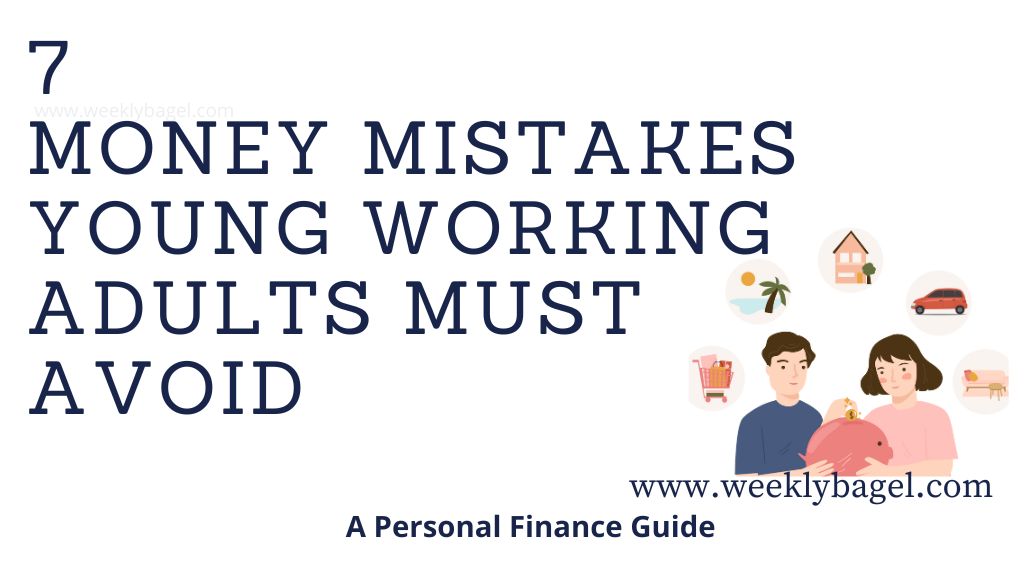
There are money mistakes young working adults must avoid to be financially free. It is normal to make money mistakes as an adult. The goal in this life journey however, is to make as little of these financial mistakes as you can get away with. This is especially, as you age gracefully in your art of living.
At least, this is what I believe in and preach in all my articles. So why is it important, my good reader?
Our dear country, the United States Of America, feeds on the financial illiteracy of its young working class adults. You are expected to consume wantonly, regardless of its detriment to your current financial wellbeing and future financial state. Financial resources such as easy access to cash and credit are made available for you to ensure this consumerism.
It is part of what fuels our beloved capitalist economy. Without a huge young working population in debt, it is hard for the economy of a country to be buoyant from just its exports revenue only. Think about what drives most people to work- bills and debt payment.
This means billions of taxable revenue for companies involved; simply put, sale and profit taxes for all levels of governments involved. There is nothing maliciously about it, since we have a choice to spend or not to.
Well, just how many young adults are in debt as a result of their financial mistakes?
According to the Annie E. Casey Foundation, 1 out of 5 adults within the age bracket of 18 to 24 years, has a pending debt in collection. This is about 20% of American young working class adults within these age groups. It explains why many young adults are struggling financially, because of the money mistakes that got them into debt.
Common Money Mistakes People Make
Here are the most common mistakes people make with money. When you are able to put a grip on these financial mistakes, you will be on your way to financial stability.
1. Acquiring An Unnecessary Credit Card
Credit cards are a means to build your credit history and credit score. When this is not the goal, then acquiring a credit card can be a financial burden for a working class adult. What do I mean by financial burden?
When you get a credit card, you have access to certain amount of money. Although you can spend this money, it does not belong to you because it is a loan. It is given to you with the hope, you will pay back any expenditure with interest. This is amongst other fees attached to the credit card. Hence, the financial burden which comes with a credit card.
If you read my article, 6 Important Research Before Getting A Credit Card, I talked about how a credit card can end up being very expensive. This includes when you do not use the card to make purchases. By merely keeping one, a credit card company can charge for the privileges.
Of course, this is under the disguise of junk fees like maintenance fees and such. These junk fees in addition to the interest and debt payment can accumulate to be a difficult debt to pay off. A credit card is what most working adults are struggling with right now.
What age group has the highest credit card debt
Here is how I know most adults are struggling to pay off their credit card debts. An average debt survey by Credit Karma puts credit card debt for each working class adult group as such below:
| Generation | Age Range | Average Debt For Credit Karma Member(s) |
|---|---|---|
| Gen Z (born 1997–2012) | 18–26 | $2,781 |
| Millennial (born 1981–1996) | 27–42 | $5,898 |
| Gen X (born 1965–1980) | 43–58 | $8,266 |
| Baby boomer (born 1946–1964) | 59–77 | $7,464 |
On the whole, you can easily fit into one of these groups when you are using a credit card. This is especially, when it is unnecessary for you to have one. To avoid being financially broke and messing up your credit history, avoid having a credit card until you can afford to have one.
By affording to have one, I mean you can have one without struggling to pay any debt incurred on it. Personally, I recommend using your debit card for purchases. Unless you are trying to build your credit history and credit score, do not even bother with credit cards.
2. Unregulated Social Spendings
Every newly independent adult wants to experience life. Often, this is mistaken as clubbing or crazy high expenditures with friends to keep up with them. And, there is nothing wrong with it.
However, there are expensive friendships that cost a lot of money monthly. You could run into some serious debts as a result. This is especially in situations where social spendings take precedent over necessary bills.
One factor which contributes to these kinds of expenses may be peer groups. If you keep the kind of friends that makes you feel like you have to spend to keep up or fit in, then you are more likely to make a lot of money mistakes as a result. This is because of peer pressure.
Or worse, you going beyond your means to seek their approval.
As a man in his thirties today, it is not worth it. I am talking about crazy social spending to please people or be accepted by them. It can lead you into some serious debts, which you will still be paying way into your 40’s and 50’s. This is besides the presence of a substantial savings in your life.
Finally, you use expense trackers to track your monthly spendings. Expense trackers make sure you stay within the budget you have set for the month. I use them and I highly recommend one for you.
3. Loaning Money To People
The money mistakes young adults make in their 20’s, is loaning money to friends. This is especially friends who do not have the means to pay back. Why is this considered a financial mistake?
A survey by Bankrate of 2490 U.S. adults, showed 35% lost money they lended to a friend. Personally, I have lost a few thousand dollars too. I have known people who lost their friendship because their friends could not pay back all the money loaned to them or any at all.
You are probably wondering, what about being kindhearted and a brother’s keeper?
Well, banks and lenders are in a better position to help people who ask you for money than you. If they do not qualify for loans, it is probably because they have a history of not paying back. Financial institutions can access that through a credit history.
Finally, you can give money to people out of the abundance of your heart, especially during emergencies. But, avoid loaning money to people. I talked about this on Should You Loan Your Friends Money. Not only is it hard to get it back, but also it may create resentment and loss of friendship at the end.
Either way, you will be losing money meant for your savings. Don’t you agree, dear reader?
4. Expensive Student Loan and Debt
It is easy to into a high student loan debt. This is especially when you graduate in majors where the student loan debt is greater than the future annual salary. I have met some fellow American graduates with this kind of financial predicament.
I often asked myself, of what use is an education where the debt for such an education is greater potential annual salary?
You may argue it is worth it, but when people complain about their student debts, then it becomes a financial mistake they should have avoided in the first place. Now, I know it may not be possible to avoid student loans. However, you can study an expensive major in a cheaper college, rather than an expensive college.
If you are an avid reader of this blog, I am against going to costly private colleges, when public colleges often the same amount of knowledge. How does one know this fact?
At the end of college, jobs are offered based on your skill level and experience. Where you go to school rarely matters, when you have no skill or experience to offer. Hence, why you should try to avoid acquiring more than the average student loan debt for your intended major.
If you are interested in graduating from college without getting a student loan, you can read how I graduated from college debt free. Otherwise, be wise about the cost of college education you intend to pay. Always shop around for affordable colleges to reduce the size of your student loan debt.
5. Missing Your Monthly Bills
There are bills which can ruin your credit history, when you miss them. This includes your credit debt payment, rent and car notes amongst other monthly debt payments. Bill companies report to credit bureau 45 days after a bill’s due date, whenever you fail to make a payment.
Credit bureaus either reward or punish you for missing a payment towards your debts at an agreed time. The negative effects of these debts on young working class adults include a bad credit history and a low credit score. How would this financial mistake affect you?
You simply cannot qualify for any loan. Even when you do, it will come with a higher than usual interest rate. This is because you have a history of missed payments on your credit history. In retrospect, it is why credit card companies and lenders ask for your information to access your credit score and history.
If you keep making this kind of money mistake, it gets worse. Banks, car dealerships, apartments or any business will not want to do business with you because you are bad business. Of course, this is according your damaged credit history done by companies whose debts you are yet to pay.
6. Sticking In A Low Paying Job For Years
When I first moved to the States in 2014, my first job here was janitorial making $8.25 per hour. I was not your regular janitor. I scrubbed off the stains off toilet bowls. Yep- that was me!
Today, I work along side the best surgeons in the States of Texas in six surgical specialties. I plan the surgical cases, get everything we will need for the surgeries and assist them during surgeries. Now, why did I just tell you this part of my story?
When I started working at Lackland Air force Base as a janitor, I had young peers working along side me. Eight years later, I met one of them and he was still doing the same job!
This is one of the worst financial mistakes you can ever do to yourself.
Sticking in the same low paying job for years. It is a money mistake because inflation does not sit still for us- the working class. Hence, the importance of acquiring new skills every four years, in order to improve your income. It will help you avoid having to borrow to make ends meet with the rising inflation.
When I talk about skill acquisition, I do not necessarily mean going to college to acquire a degree. One beautiful aspect of our beloved country- the United States of America, is there are trade schools where you can pick practical job skills which can make you tens of thousands a year.
You do not have to be book smart to pick these skills up. Trade schools are unlike our traditional schools. You do not have to cram and regurgitate useless knowledge. There- you learn by practice and experience. It is how you avoid this common financial pitfall, because it will trap you in a life of continuous financial struggle.
7. Saving Less than Ideal Monthly
When we are young and struggling to make ends meet, it is hard to save money. This is especially, when we are paid minimum wages monthly. However, it is a necessity we cannot do without.
You see, not saving a part of your paycheck or saving less than ideal could put you in a position of making money mistakes. The Covid-19 pandemic proved this to be the truth for many working class adults. Some lost their jobs, went into debts or even moved in with their parents because there was no money to reduce the financial stress created by the Pandemic.
Having said that, what is a realistic amount of money to save monthly in order to avoid going into debt?
No matter what your income is right now, you should save at least 10% of your paycheck. Your monthly expenses should revolve around what remains. Here is what I mean.
If you bring home $1500 monthly, that is $150 for savings. It is not much considering you have $1350 going into monthly expense. At least ten percent of your paycheck is what you pay yourself first.
This is what makes sure you have money for emergency. Besides, you should try to fit your lifestyle into the remaining $1350. Your rent should not be more than $700 monthly. To simply, your expenses should be such that it cannot exceed $1350. You can read how to create a budget to budget your monthly expenses.
Finally, try use budgeting apps to budget your monthly income. This allows you to spend within acceptable limits without incurring debt or saving less than ideal monthly. Trust me, budget works a lot of miracles directing money into your savings.
What Can Help You Avoid Money Mistakes
We can avoid money mistakes by using our common sense.
By common sense here, I mean being practical with money. Live within your means. Avoid credit cards, unless you need one to build your credit history. And, go for public or community colleges to reduce your student loan debt.
In addition, paying your bills on time make sure your credit history is good. That way, you can qualify for low interest loans with low interest rate. This is importance, when you are ready to get a house, a car or a business.
On the whole, common sense goes a long way in helping us manage our money and avoid financial mistakes. We can sharpen our financial common sense by educating ourselves financially. Everyone makes financial mistakes at one point in their lives. The goal is to make as few as you can to avoid stifling your financial future and disrupting your current financial wellbeing.




 How To Deposit Cash On Wells Fargo ATM Instantly
How To Deposit Cash On Wells Fargo ATM Instantly